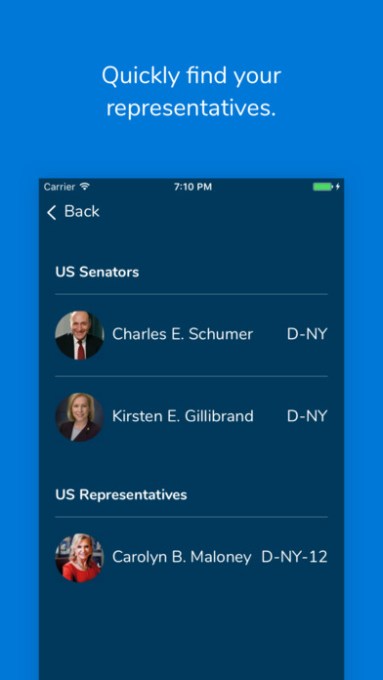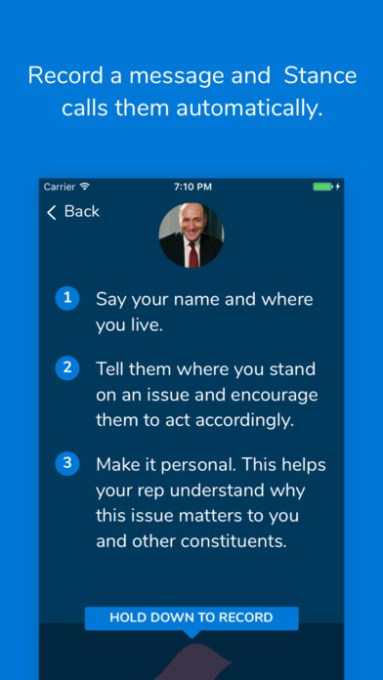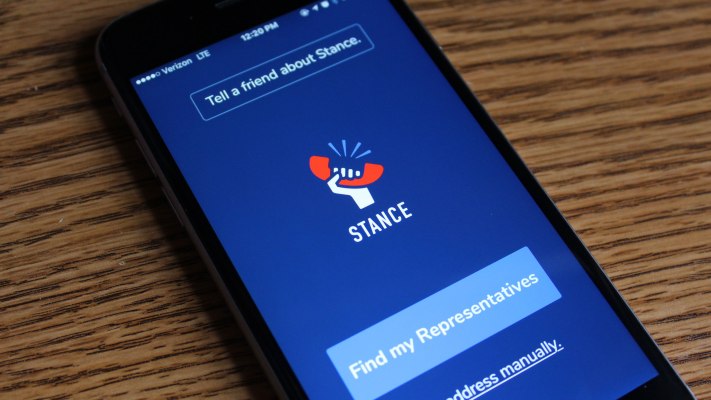Want to call your senator or U.S. representative to let them know where you stand on an issue, but don’t have the time to hunt down their phone number, wait on hold, or continually redial to get past the busy signals? A new app called Stance aims to help. Instead of simply providing a way to call your reps, as many apps today do, Stance lets you pre-record your voice message to be left on the rep’s voicemail when the phone lines are freed up.
But wait!, you ask. Don’t congressional staffers answer the phones? How is Stance going directly to voicemail to play your message on their machine?
Simple. It only places the calls at night, so voicemail is sure to pick up.
The initial idea for the app came from Nathaniel Teichman, COO at a small audio startup called Ense, from Venmo co-founder Iqram Magdon.
Teichman explains he was inspired to build Stance after attending a political rally and hearing about the frustration people had when trying to call their reps.
“At the same time I was reading and hearing more and more about the importance of calling Congress,” he says. “I thought there must be a better way for people to get through so I met with a few coworkers and we realized we were in a position to come up with a better solution.”
The coworkers spent the next few weekends working on the app, which works on top of Twilio. They mapped out the call trees for each representative’s office, so the calls can get through. The app also uses Ense’s API to record, store and post the audio – which is why Stance is now an official company project within Ense.
Using Stance is pretty simple. The app uses your location to identify who your representatives are, including both House reps and Senators. You’re then taken to a screen where you can record your message.
The app doesn’t have a political agenda. Instead, it offers basic “how to” instructions that remind you to say your name and location, tell the rep how you stand on the issue and what you want them to do, and it suggests that you make your recording personal.
The recordings are saved until after hours then sent to the reps’ voicemail.

However, there is one big caveat to using Stance: it publicizes your recordings. (The app discloses this during the sign-on process, so it’s not a surprise.)
Your recordings are published to Stance’s website and they’re tweeted at the rep on Twitter, the company says.
The latter is meant only as another way of getting the rep’s attention, but tweets are not officially counted as outreach. However, many representatives have been overwhelmed with phone calls during the Trump presidency, and their voicemails remain full – sometimes, intentionally. Tweeting at least gives you another means of having your voice heard.

Of course, not everyone wants to have their messages made public – especially since they are leaving their full name and location. But at this time, there’s no option to set a voice message to private, which is something of an oversight.
That could dampen Stance’s potential usefulness for those who don’t want their political leanings to be publicized, or who want to share their thoughts on touchy issues more privately.
For example, if you were reaching out regarding your rep’s position on healthcare, you might want to make your message more meaningful by sharing your own struggles with health issues and discuss how the current system, the Affordable Care Act, has impacted your life. And you might not want that message posted publicly on the internet.
One of Stance’s co-creators, and Ense’s Head of Product, Ashwinn Krishnaswamy, pushes back on the privacy concerns, saying that “the public blowback hasn’t been as great as we thought.” That’s not entirely true, though – many of the initial App Store reviews are from people who don’t like the app’s public nature.
Krishnaswamy says that the team is still gathering feedback about the private versus public nature of Stances, however.
Stance is a free download for iOS or Android.
